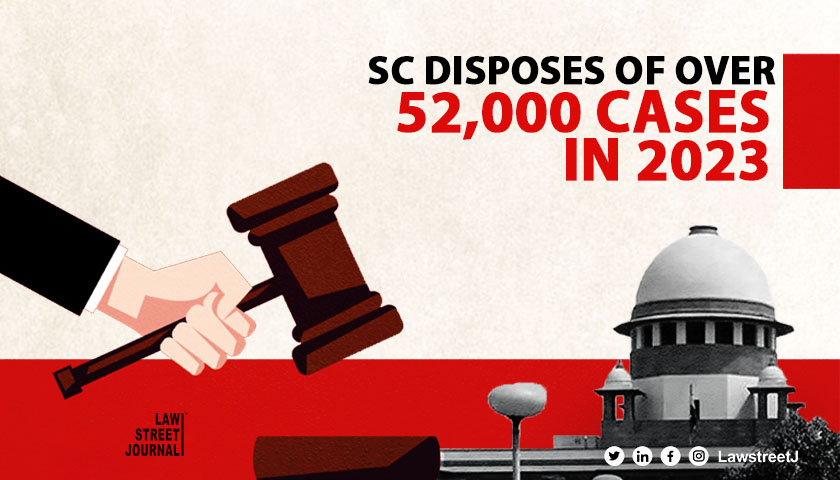NEW DELHI: The Supreme Court has disposed of "unprecedented" 52,191 cases, including 45,642 miscellaneous matters and around 6549 regular matters, in the year 2023.
The total disposal stands at 52191 in comparison to the total registration of cases which was 49191.
According to an official report, the disposal is highest in terms of numbers since ICMIS (Integrated Case Management Information System) was implemented in the year 2017.
"The Supreme Court's unprecedented disposal in the year 2023 marks a watershed moment in the nation's legal history. The judiciary's proactive approach, coupled with the adoption of technology and strategic reforms, has set a new standard for timely and efficient justice delivery. This achievement not only reflects the resilience and adaptability of the Indian legal system but also reaffirms the judiciary's commitment to upholding the principles of justice in a rapidly evolving world," it said.
It was asserted that one of the key factors contributing to this historic achievement was the innovative use of technology.
During the year, the Supreme Court embraced digital platforms and modern case management systems to enhance efficiency and reduce procedural delays. E-filing, virtual hearings, and digital record-keeping played pivotal roles in facilitating a faster and more accessible justice system, it said.
In 2023, five judges and seven judges benches were also constituted wherein two seven judge matters were heard and in one of the cases judgment was reserved and in the other, the judgment was pronounced.
"Important matters like in Re Section 370, arbitration matters relating to stamped documents and their admissibility, heavy motor vehicles being driven on normal licenses, settling tussle between Delhi Government and Centre, Maharashtra Legislative Assembly Matter, rights of LGBTQ, and other important matters have been duly heard and pronounced. With strenuous efforts the pendency of five-judge constitution bench matters has been reduced from 36 to 19 (in four matters judgment is reserved), six matters pertaining to seven judges, five matters of nine judges," it said.
The report said Chief Justice of India D Y Chandrachud had a blueprint for disposal of cases and on the basis of his vision and concerted efforts by his team i.e. the Chief Justice of India and Supreme Court Judges that this disposal could be achieved.
The CJI streamlined the timeframe required for filing to the listing of the matters. In his tenure, there was a paradigm shift in the filing to the listing of the cases where in place of 10 days, from listing to filing the same was reduced to within 7 to 5 days of listing after verification of the matter. In certain matters such as Bail, Habeas Corpus, Eviction matters, Demolition, and Anticipatory bail the matters were processed in one day and listed in courts immediately thereafter keeping in view the Right to liberty at the highest pedestal, it pointed out.
In the full court meeting, it was resolved that Monday and Friday would be miscellaneous days and Tuesday would be specifically kept for after notice miscellaneous matters. Further, Wednesday and Thursday were categorised as regular matter days.
The result of the said strategy clearly impacted the disposal of matters where the important matters were disposed category-wise. With regard to the disposal of Regular matters, the said strategic intervention resulted in three times the disposal of the number of matters instituted during the said period. Additionally, the Supreme Court actively streamlined the flow of cases and expedited the resolution of legal disputes. Specialised benches were constituted to handle specific categories of cases, leading to a more specialised and efficient adjudication process, it added.
















